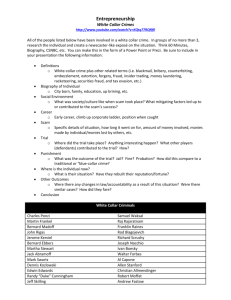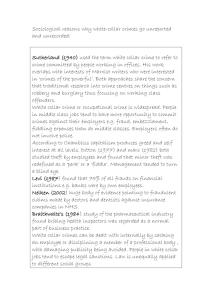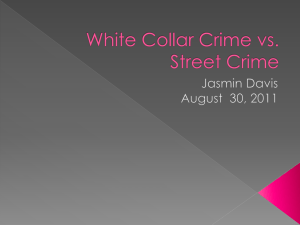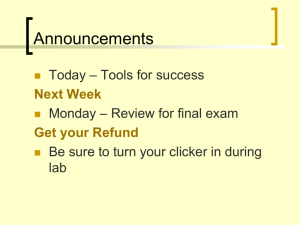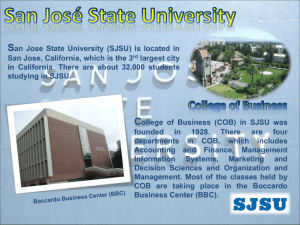JS - San Jose State University
advertisement
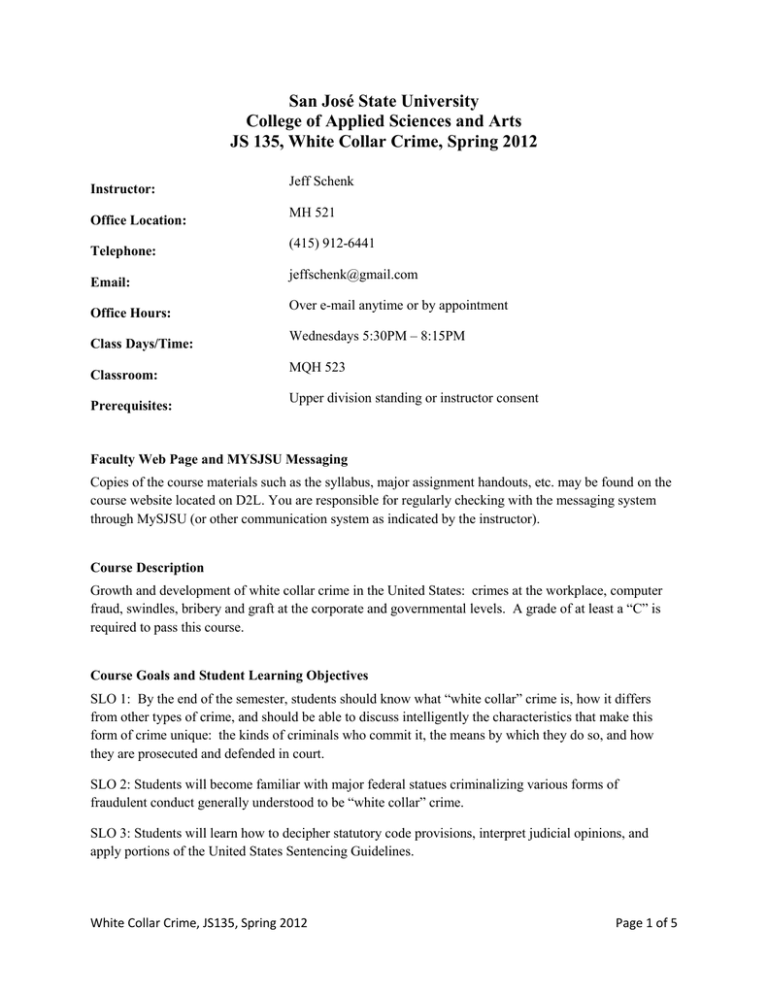
San José State University College of Applied Sciences and Arts JS 135, White Collar Crime, Spring 2012 Instructor: Office Location: Telephone: Email: Office Hours: Class Days/Time: Classroom: Prerequisites: Jeff Schenk MH 521 (415) 912-6441 jeffschenk@gmail.com Over e-mail anytime or by appointment Wednesdays 5:30PM – 8:15PM MQH 523 Upper division standing or instructor consent Faculty Web Page and MYSJSU Messaging Copies of the course materials such as the syllabus, major assignment handouts, etc. may be found on the course website located on D2L. You are responsible for regularly checking with the messaging system through MySJSU (or other communication system as indicated by the instructor). Course Description Growth and development of white collar crime in the United States: crimes at the workplace, computer fraud, swindles, bribery and graft at the corporate and governmental levels. A grade of at least a “C” is required to pass this course. Course Goals and Student Learning Objectives SLO 1: By the end of the semester, students should know what “white collar” crime is, how it differs from other types of crime, and should be able to discuss intelligently the characteristics that make this form of crime unique: the kinds of criminals who commit it, the means by which they do so, and how they are prosecuted and defended in court. SLO 2: Students will become familiar with major federal statues criminalizing various forms of fraudulent conduct generally understood to be “white collar” crime. SLO 3: Students will learn how to decipher statutory code provisions, interpret judicial opinions, and apply portions of the United States Sentencing Guidelines. White Collar Crime, JS135, Spring 2012 Page 1 of 5 Required Texts/Readings Textbook No textbook is required for this class. Some class readings will come from the textbook: White Collar Crime: Law and Practice, 3rd Edition, by Jerold H. Israel, Ellen S. Podgor, Paul D. Borman, and Peter Henning, 2009. Professor Henning has graciously provided me with his book and given me permission to distribute chapters of the book to you at no cost. (In the syllabus, this book will be referred to as “WCC Law and Practice.”) Other Readings The readings for this class will be made available either in class or through Desire2Learn. All readings will be announced at least one class period before they are due. (Some are already embedded in the course syllabus.) Additional background readings may be found at: http://lawprofessors.typepad.com/whitecollarcrime_blog/ or http://dealbook.nytimes.com/category/columnists/white-collar-watch/ Students who miss class are responsible from obtaining the assignments from another student or from the course website. Classroom Protocol Students are expected to attend each and every class on time. Students must behave professionally. Students must turn off cell phones before entering the classroom. Grades will be based, in part, on classroom participation. (See below for grade breakdown.) Dropping and Adding Students are responsible for understanding the policies and procedures about add/drop, grade forgiveness, etc. Refer to the current semester’s Catalog Policies section at http://info.sjsu.edu/static/catalog/policies.html. Add/drop deadlines can be found on the current academic calendar web page located at http://www.sjsu.edu/academic_programs/calendars/academic_calendar/. The Late Drop Policy is available at http://www.sjsu.edu/aars/policies/latedrops/policy/. Students should be aware of the current deadlines and penalties for dropping classes. Information about the latest changes and news is available at the Advising Hub at http://www.sjsu.edu/advising/. Assignments and Grading Policy Grades will be based on four components: class participation (see note below), three short “pop” quizzes (SLO 2, SLO 3) (lowest quiz score will be dropped, remaining two quizzes total value: 20%), a midterm exam (30%) (SLO 2), and a final exam (50%) (SLO 1, 2, and 3). NO EXTRA CREDIT IS AVAILABLE. White Collar Crime, JS135, Spring 2012 Page 2 of 5 The quizzes will consist of a single question or two (perhaps with sub-parts) based on recent class lectures, and will call for answers to be written directly on the quiz. The quizzes will be given in class. The midterm and final exam will require essay responses. Please bring a Bluebook to write your answers to the midterm and the final exam. Quizzes, the midterm exam, and final exam will be “open book.” This includes notes stored on a laptop computer, but does not include accessing the Internet. The highest grade possible will be an A+. Plus and minus grades will be given for every grade down to a D -. 90% and higher will be an A (with plus and minus grades as follows: 90-93 % = A-, 94-96 = A, 97 and up = A+). The same breakdown will apply to B (80-90%), C (70-80%), and D grades (60-70%). Less than 60% would be an F. Important Note: class participation will also factor significantly into your grade. What that means is that I reserve the right to “round” your grade up or down by not more than one level (e.g., from a B+ to a B) depending on whether you (1) showed up consistently, (2) stayed for the entire class period, and (3) contributed meaningfully to class discussion. University Policies Academic integrity Your commitment as a student to learning is evidenced by your enrollment at San Jose State University. The University’s Academic Integrity policy, located at http://www.sjsu.edu/senate/S07-2.htm, requires you to be honest in all your academic course work. Faculty members are required to report all infractions to the office of Student Conduct and Ethical Development. The Student Conduct and Ethical Development website is available at http://www.sa.sjsu.edu/judicial_affairs/index.html. Instances of academic dishonesty will not be tolerated. Cheating on exams or plagiarism (presenting the work of another as your own, or the use of another person’s ideas without giving proper credit) will result in a failing grade and sanctions by the University. For this class, all assignments are to be completed by the individual student unless otherwise specified. If you would like to include your assignment or any material you have submitted, or plan to submit for another class, please note that SJSU’s Academic Policy S07-2 requires approval of instructors. Campus Policy in Compliance with the American Disabilities Act If you need course adaptations or accommodations because of a disability, or if you need to make special arrangements in case the building must be evacuated, please make an appointment with me as soon as possible, or see me during office hours. Presidential Directive 97-03 requires that students with disabilities requesting accommodations must register with the Disability Resource Center (DRC) at http://www.drc.sjsu.edu/ to establish a record of their disability. Student Technology Resources Computer labs for student use are available in the Academic Success Center located on the 1st floor of Clark Hall and on the 2nd floor of the Student Union. Additional computer labs may be available in your department/college. Computers are also available in the Martin Luther King Library. A wide variety of audio-visual equipment is available for student checkout from Media Services located in IRC 112. These items include digital and VHS camcorders, VHS and Beta video players, 16 mm, slide, overhead, DVD, CD, and audiotape players, sound systems, wireless microphones, projection screens and monitors. White Collar Crime, JS135, Spring 2012 Page 3 of 5 Learning Assistance Resource Center The Learning Assistance Resource Center (LARC) is located in Room 600 in the Student Services Center. It is designed to assist students in the development of their full academic potential and to inspire them to become independent learners. The Center's tutors are trained and nationally certified by the College Reading and Learning Association (CRLA). They provide content-based tutoring in many lower division courses (some upper division) as well as writing and study skills assistance. Small group, individual, and drop-in tutoring are available. Please visit the LARC website for more information at http://www.sjsu.edu/larc/. SJSU Writing Center The SJSU Writing Center is located in Room 126 in Clark Hall. It is staffed by professional instructors and upper-division or graduate-level writing specialists from each of the seven SJSU colleges. Our writing specialists have met a rigorous GPA requirement, and they are well trained to assist all students at all levels within all disciplines to become better writers. The Writing Center website is located at http://www.sjsu.edu/writingcenter/about/staff/. Peer Mentor Center The Peer Mentor Center is located on the 1st floor of Clark Hall in the Academic Success Center. The Peer Mentor Center is staffed with Peer Mentors who excel in helping students manage university life, tackling problems that range from academic challenges to interpersonal struggles. On the road to graduation, Peer Mentors are navigators, offering “roadside assistance” to peers who feel a bit lost or simply need help mapping out the locations of campus resources. Peer Mentor services are free and available on a drop –in basis, no reservation required. The Peer Mentor Center website is located at http://www.sjsu.edu/muse/peermentor/ JS 135, White Collar Crime, Spring 2012 Week 1 Date Topics Readings 1/25/12 Please read White Collar Crime: Law and Practice (“WCC Law and Practice” hereafter) Chapter 1. All readings from WCC Law and Practice are available for download from Desire2Learn. 2 2/1/12 3 2/8/12 4 2/15/12 Introduction and Course Overview, Orientation to White Collar Crime Major federal white collar criminal statutes: Conspiracy (Title 18, United States Code, Section 371); Mail Fraud (18, U.S.C., Section 1341); Wire Fraud (18, U.S.C. Section 1343) Money Laundering and Tax Fraud Securities Fraud, Corporate Fraud, Sarbanes-Oxley and Dodd-Frank Read selected portions of WCC Law and Practice Chapter 5 (pgs 145 – 170 and pgs 200 – 215). Read the following statutes: Title 18, United States Code, Sections 371, 1341, 1343. Read a selected portion of Chapter 5 (pgs 215 – 219); Houston Business and Law Journal article available on D2L. Read A Dirty Business by George Packer in the June 27, 2011 issue of The New Yorker. The article can be found here: http://www.newyorker.com/reporting/2011/06/27/110627fa_fact_packer; Read the Dodd-Frank Congressional Research Service article available on D2L White Collar Crime, JS135, Spring 2012 Page 4 of 5 5 6 2/22/12 2/29/12 7 3/7/12 8 9 3/14/12 3/21/12 10 11 3/28/12 4/4/12 12 4/11/12 13 4/18/12 14 4/25/12 15 5/2/11 16 5/9/12 17 5/23/12 Health Care Fraud Computer Crimes, Trade Secret, Criminal Copyright, Economic Espionage Export Enforcement MIDTERM EXAM Perjury, False Statements and Obstruction of Justice NO CLASS Bankruptcy Fraud & Public Corruption, Fiduciary Fraud, Honest Services Fraud Mortgage Fraud Prosecuting and Defending WCC – investigation, charging, defenses, trial United States Sentencing Guidelines Read WCC Law and Practice Chapter 8. (Tangled Webs by James B. Stewart is not required reading, but if you are interested in perjury, false statements, and obstruction of justice charges detailed in several high profile cases, read his book.) SPRING BREAK Read a selected portion of Chapter 5 (pgs 170 – 196) Read The Eight Days of the Financial Crisis by James B. Stewart in the September 21, 2009 issue of The New Yorker. The article can be found here: http://www.newyorker.com/reporting/2009/09/21/090921fa_fact_stewart?currentPage=all Read this posting: http://dealbook.nytimes.com/2011/08/10/how-serious-a-crime-is-insidertrading/ Read Section 2B1.1 of the United States Sentencing Guidelines (“USSG”). It can be found here: http://www.ussc.gov/Guidelines/2010_guidelines/Manual_HTML/2b1_1.htm WCC Law and Practice Chapter 17 FINAL EXAM REVIEW FINAL EXAM REVIEW FINAL EXAM White Collar Crime, JS135, Spring 2012 Page 5 of 5
